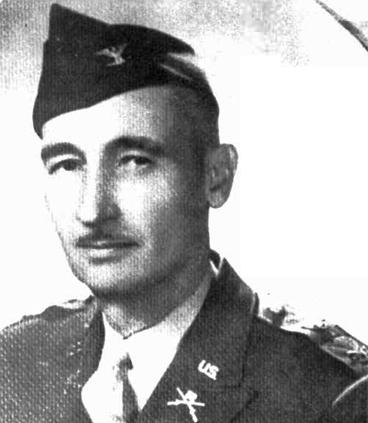

Hervey Aldrich Tribolet
Commanding Officer 22nd Infantry
4th Infantry Division
February 18, 1942 - June 10, 1944
Hervey A. Tribolet was born in Bassein, Burma on July 18, 1893.
His father Emile Tribolet had
emigrated to the United States from the Alsace region of France
on March 10, 1881 and became a naturalized American citizen on
April 26, 1888 at Metamora, Illinois.
Emile Tribolet was a minister and missionary for the American
Baptist Foreign Missionary Society and
spent at least thirty years in Burma on missionary work. It was
during his father's early missionary years
in Burma that Hervey A. Tribolet was born.
Hervey A. Tribolet entered
Denison University in Ohio in September 1911 at the age of
eighteen and graduated
in 1915 with a Bachelor's Degree in Philosophy.
While at Denison University
Tribolet was a varsity athlete on the Track Team.
He was captain of the 1 Mile Interclass Relay Team.
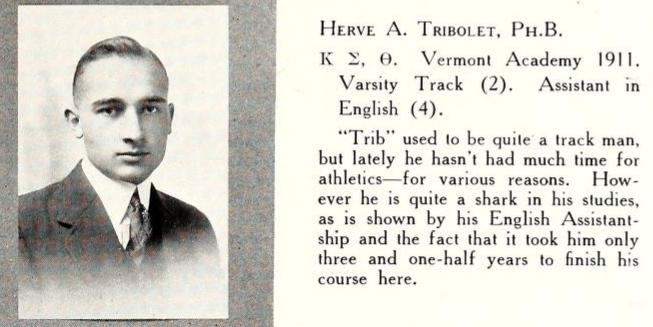
The entry for Hervey A.
Tribolet during his senior year at Denison University.
(In subsequent years his first name was always given and he
always signed it Hervey.)
From The Adytum
yearbook of Dension University Volume Twenty-two 1915
From Coleen Goodhart via Paul Harris
At Denison University Tribolet was a member of the Gamma Xi Chapter of Kappa Sigma Fraternity.
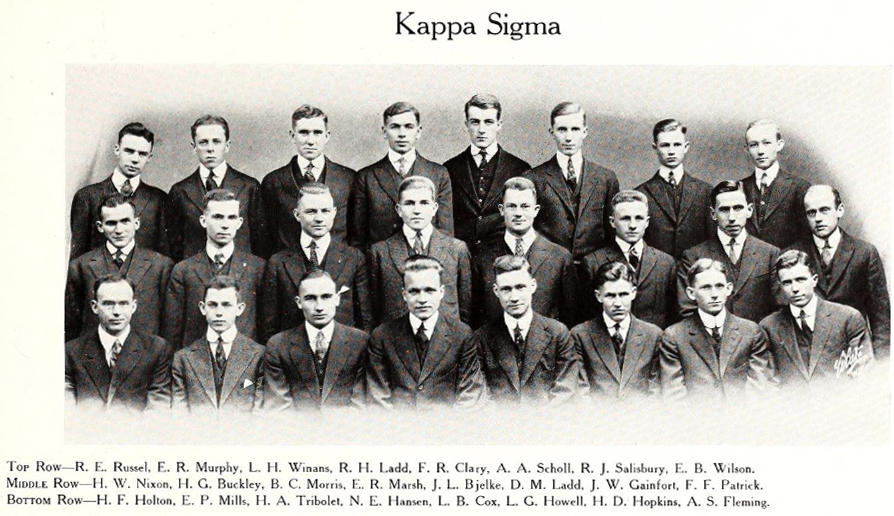
Gamma Xi Chapter of
Kappa Sigma Fraternity at Denison University 1915.
Hervey A. Tribolet is in the bottom row, third from the left.
From The Adytum
yearbook of Dension University Volume Twenty-two 1915
From Coleen Goodhart via Paul Harris
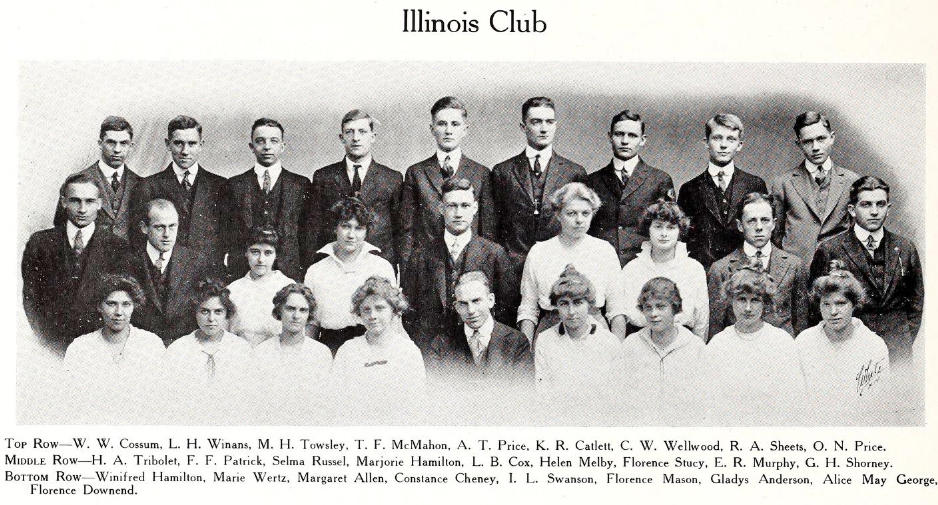
The Illinois Club at
Denison University 1915. (Part of the Alumni organization of the
university.)
Hervey A. Tribolet is in the middle row first on the left.
From The Adytum
yearbook of Dension University Volume Twenty-two 1915
From Coleen Goodhart via Paul Harris
On June 15, 1917 Tribolet
registered for the draft which had been instituted for World War
I.
On his registration form he gave his place of birth as Town:
Bassein, State: Burma, Country: India.
(This country of birth as India would be duplicated in all his
subsequent entries in the U.S. Army Registers.)
Also on the form he gave his address as Chicago, Illinois and his
occupation as Investigator of Claims for
the Travelers Insurance Company located in Chicago. He indicated
that he had prior military service of
2 years as 1st Lieutenant Infantry Branch at the Vermont Academy
(which was the college preparatory school
in Saxtons River, Vermont which he attended before enrolling in
Denison University.) His registration also
noted that he was tall, slender, had gray eyes and brown hair.
Tribolet was commissioned a 2nd
Lieutenant in the Officers' Reserve Corps on August 15, 1917 and
entered active duty
on that date. This position was vacated on May 23, 1918. He was
commissioned a 2nd Lieutenant in the 57th Infantry of
the Regular Army on May 1, 1918. The 57th Infantry was assigned
to the 15th Division which served in the continental
United States during the war and did not go overseas. It was
demobilized in February 1919 at Camp Logan, Texas.
Tribolet was given the temporary
rank of 1st Lieutenant on September 13, 1918, a position he
vacated on September 26, 1919.
On that date he was promoted to 1st Lieutenant of Infantry in the
Regular Army.
Tribolet was honorably discharged from the Officers' Reserve Corps on May 24, 1920.
He was promoted to Captain in the Regular Army on July 1, 1920.
Tribloet was stationed with the
5th Infantry at Fort Williams, Maine in 1922 when he was detailed
to become a professor of military science and tactics at Bangor
High School in Bangor, Maine.
In 1931 he graduated from the Infantry School Advanced Officer Course at Fort Benning, Georgia.
|
Hervey A. Tribolet as a
Captain and student of the from: |
On August 1, 1935 he was
promoted to Major. He received a promotion to Lieutenant Colonel
on August 18, 1940.
He was given the temporary rank of Colonel in the Army of the
United States (AUS) on December 24, 1941.
In February of 1942 Tribolet
assumed command of the 22nd Infantry and led the Regiment during
extensive training at
Camp Gordon, Fort Dix and Camp Gordon Johnston. He sailed with
the 22nd Infantry to England where he guided his
Soldiers through even more intense training in preparation for
the invasion.
Tribolet led the Regiment ashore
on Utah Beach on D-Day June 6, 1944. On June 11, 1944
Colonel Robert Foster assumed command of the Regiment.
Several accounts state Foster as
taking command on June 26. However, the 22nd Infantry Daily
Action Journals
for the month of June 1944 show Tribolet in command of the 22nd
on June 10 and Foster in command on June 11.
In later years Major General
John Ruggles told the story of how Tribolet was the godfather to
the son of
Captain Tom Shields, Commander of Company A 22nd Infantry. On
June 8, 1944 in the attack against
the German Coastal battery at Crisbecq Captain Shields was killed
in action and his Company suffered
a tremendous amount of casualties. The VII Corps Commander Major
General J. Lawton Collins had
come to the Regimental Headquarters of the 22nd Infantry to find
out why the Regiment had not achieved
its planned objectives and encountered Colonel Tribolet feeling
despondent over losing Shields and so many
soldiers in Company A. Because of Tribolet's state of mind at the
time and his failure to secure the operational
objectives Collins relieved Tribolet on the spot.
Tribolet was well liked by his
Soldiers. He commanded the Regiment through two and a half years
of training, making sure
the 22nd Infantry was well prepared to land and fight in France.
If the speculation is correct that Tribolet was relieved
for failure to make his objectives in the days following the
beach landings, the fault should have been placed
on the fact that the 22nd Infantry met extremely fierce and
determined resistance by the German military.
Casualties were very high in the 22nd Infantry during this time
and indeed throughout the rest of the
4th Infantry Division as well.
The following passage from Bill
Boice's
History of the 22nd Infantry in WW2 illustrates the situation:
On June 10th,
Colonel Hervey A. Tribolet was relieved of his command
of the regiment. Division and Corps were dis-satisfied with the
progress the
Twenty-Second was making. Slowed by the beach fortifications,
Azeville,
Ozeville, Crisbecq and the Chateau all posed foridable barriers.
The men of
the Twenty-Second naturally felt they were doing their utmost. It
was with
genuine regret the men of the regiment learned that Colonel
Tribolet had been
relieved. "Trib" had trained them; he knew many of
their families, and he was
both loved and respected by the officers and men.
Their regard for him and their confidence in his ability and leadership remained.
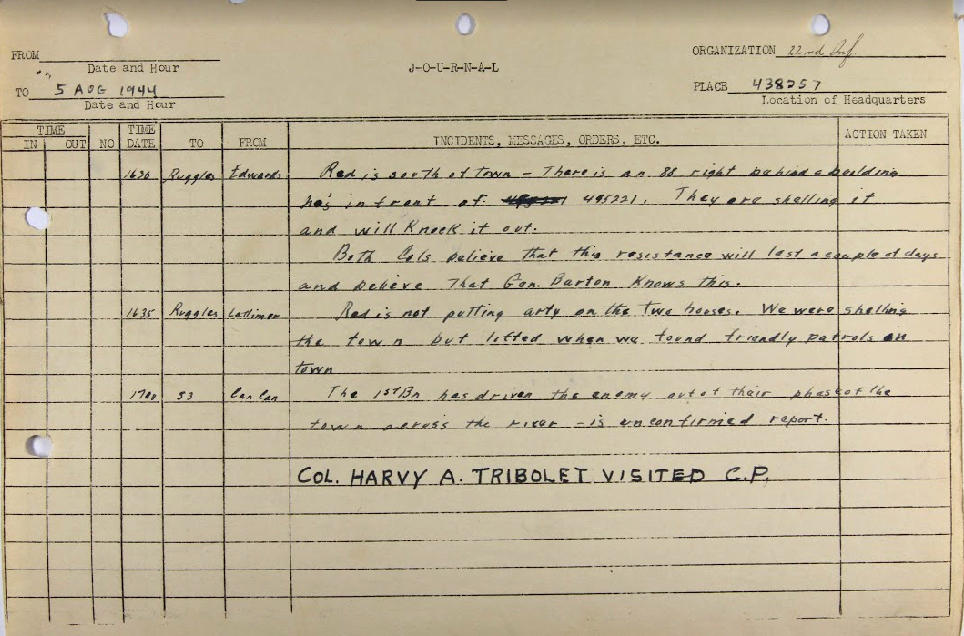
Above: A page from the
Daily Action Journal of the 22nd Infantry for August 5, 1944.
A notation has been made at the bottom of the page that Colonel
Hervey A. Tribolet visited the Command Post of the 22nd Infantry
on that day.
The fact that his visit was made a part of the official record of
the Regiment and entered in large and bold letters attests to the
high regard in
which Tribolet was still held by the Regiment even months after
he had been relieved of command.
Courtesy of John Tomawski
In a letter written in 1994 to
an author writing a book about the Battle of the Hürtgen Forest
retired Colonel Earl Edwards,
who had been a Company Officer and later a Battalion Commander
under Tribolet in the 22nd Infantry had the following
to say about the early leadership of the 22nd Infantry, including
his thoughts about Tribloet:
Looking at the
leadership I would say we had a series of fine, well-respected
commanding officers starting with
Colonel Albert S. Peake in the 40's followed by Col.
"Daddy" Weems and on into early combat with Col.
Tribolet.
Of these I think
most of us would give great credit to Col. Tribolet. Most of us
would agree that he built the regiment.
He was a quiet, gentle father figure, much beloved and respected
by all of us. None of us wanted to be seen by him
as unmannerly or disrespectful nor did we want to hurt his
feelings in any way--so we learned to get along.
I remember one
time when Guy DeYoung, Regimental S-4, and I clashed over a
supply problem. Since we were unable
to agree I suggested we take it to Col. Tribolet for resolution.
Guy thought a minute and said, "Now how would we look
to Col. Trib being unable to solve a little problem like
this?" I agreed and we quickly found a solution. What he
thought
about us was important.
Colonel Tribolet
couldn't handle the regiment in combat and we all understood
that. Colonel Lanham, and later
Colonel Ruggles, fully understood the "family" nature
of the regiment and wisely played to that strength in their
command style. ²
After leaving the 22nd Infantry
Tribolet was assigned to 12th Army Group Observation Group
as a Combat Observer. A report was found by Dr. Paul Harris of
Auburn University written by
Colonel Hervey A. Tribolet to the Commanding General of 12th Army
Group and dated October 2, 1944
in which Tribolet outlined difficulties in the replacement system
for the 79th Division. By the end of the war
12th Army Group controlled four American Armies in the European
Theater of Operations.
On October 31, 1946, Tribolet
retired from the Regular Army with the rank of Colonel.
He received a disability in the line of duty.
Among his awards is the Silver Star Medal.
In 1924 Hervey A. Tribolet
married Mary Eloise Webb from Bangor, Maine. They had one son,
Robert, who retired from the U.S. Air Force as a Colonel.
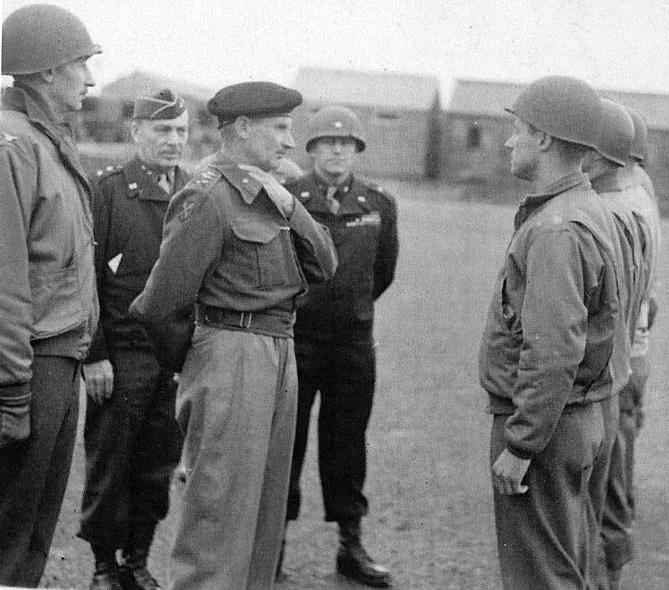
April 21, 1944 - Devon,
England - Inspection of 22nd Infantry troops by General Sir
Bernard Montgomery
Left to right: Colonel Hervey Tribolet, Commander 22nd Infantry,
MG Raymond Barton, Commanding General 4th Infantry Division,
General Montgomery, BG Henry A. Barber, Assistant Commanding
General 4th Infantry Division, Major Earl Edwards, Commander
2nd Battalion 22nd Infantry.
Photo courtesy of John and Gladys King
|
Colonel Hervey Tribolet, Commanding Officer 22nd Infantry. This photo was taken in the
marshalling area Photo from the 1946 Regimental yearbook |

Tribolet's signature on his WWI draft registration form.
Hervey Tribolet is buried in Arlington National Cemetery
Section 3 Grave 2420-LH
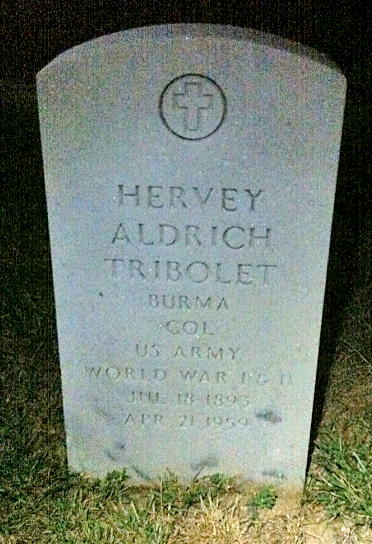
Grave marker for Hervey Tribolet
Photo from the Arlington National Cemetery website
Home | Photos | Battles & History | Current |
Rosters & Reports | Medal of Honor | Killed
in Action |
Personnel Locator | Commanders | Station
List | Campaigns |
Honors | Insignia & Memorabilia | 4-42
Artillery | Taps |
What's New | Editorial | Links |